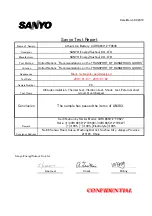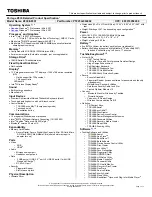
Identifying the Hardware Features
Rear View
Inside View
Bottom View
1
The rear door covers the
connectors at the rear of the
computer.
2
The connector door allows
you to connect a cable to the
system-expansion connector
when the rear door is closed.
3
The rear infrared port. (See
“front infrared port” on page
17.)
4
The system-expansion
connector is used to connect
the IBM Dock I, Dock II, or port
replicator. (See page 175.)
5
The power shutdown switch
is used to turn the computer off
when an application locks up
or the computer will not accept
any input. Use the tip of a pen
to press this switch.
6
The external-display
connector is where you
connect the signal cable of
VGA, SVGA, or compatible
display. (See page 170.)
7
The parallel connector is
where you usually connect a
parallel-printer signal cable.
8
The serial connector is
where you connect a 9-pin,
serial-device cable.
9
The power jack is where the
AC Adapter cable is
connected.
1
The option cover can be
removed when options are
used in the UltraBay.
11
The headphone jack, a
1/8-inch (3.5-mm) diameter
jack, is where you connect a
stereo headphone or external
speakers. (See page 71.)
12
The microphone/line-in jack,
a 1/8-inch (3.5-mm) diameter
jack, is where a stereo
microphone or external audio
device is connected. (See
page 71.)
13
The modem/fax port is where
you connect a modem
connector or attachment. This
is offered as an option in some
countries.
(For use: see page 71. For
installation: see page 163.)
14
The power switch turns the
computer on and off.
1
The modem/fax port release
latch releases the modem/fax
port from the computer. (See
page 163.)
2
The removable diskette drive.
See page 17. (For installing
options in the UltraBay: see
page 159.)
3
The battery pack allows you
to operate the computer
when ac power is not
available. (See page 24.)
4
The security latch opens or
closes the security keyhole.
(See page 131.)
5
The removable hard disk
drive can be replaced with one
of a different capacity. (See
page 149.)
1
The memory slot accepts one
or two memory module (DIMM)
options to increase the memory
capacity of your computer.
(See page 142.)
2
The memory-slot cover is
opened when you insert
DIMM options. (See page
142.)
3
The serial number (S/N)
identifies your computer. Write
it down on page 237.
Chapter 2. Getting Familiar with Your Computer
19
Summary of Contents for ThinkPad 760C
Page 2: ...i...
Page 11: ...x IBM ThinkPad 760C User s Guide...
Page 17: ...Index 301 xvi IBM ThinkPad 760C User s Guide...
Page 27: ...Getting Started 5 4 1 1 2 2 10 IBM ThinkPad 760C User s Guide...
Page 29: ...Getting Started 6 7 8 2 2 3 3 1 1 12 IBM ThinkPad 760C User s Guide...
Page 53: ...Carrying the Computer Mwave Telephone Answering Machine 82 36 IBM ThinkPad 760C User s Guide...
Page 153: ...Using Locks 136 IBM ThinkPad 760C User s Guide...
Page 193: ...Attaching an IBM Dock I or Dock II Expansion Unit 176 IBM ThinkPad 760C User s Guide...
Page 259: ...Getting Service 242 IBM ThinkPad 760C User s Guide...
Page 265: ...Avoiding Hardware Conflicts 248 IBM ThinkPad 760C User s Guide...
Page 283: ...Advanced Information for PC Cards 266 IBM ThinkPad 760C User s Guide...
Page 289: ...Information for Mwave DSP Features 272 IBM ThinkPad 760C User s Guide...
















































